to measure record sales.
No song’s the winner,
no song ever fails.
Imagine all releases
treasured equally….
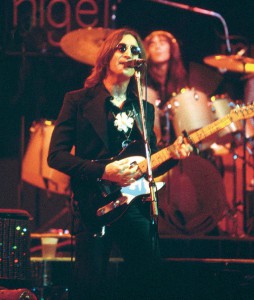 Imagine the most defining song of John Lennon’s career NOT reaching the number one spot on the Billboard charts when it was released in October 1971. I wonder if you can. Surprisingly, John’s iconic peace anthem “Imagine” actually peaked at number three, which just goes to prove that chart position does not a legendary song make. John’s only solo career single to hit the number one spot during his lifetime was “Whatever Gets You Through the Night,” which topped the U.S. charts in November 1974.
Imagine the most defining song of John Lennon’s career NOT reaching the number one spot on the Billboard charts when it was released in October 1971. I wonder if you can. Surprisingly, John’s iconic peace anthem “Imagine” actually peaked at number three, which just goes to prove that chart position does not a legendary song make. John’s only solo career single to hit the number one spot during his lifetime was “Whatever Gets You Through the Night,” which topped the U.S. charts in November 1974.
As was his method, media junkie John often copped song titles and ideas from tabloids and boob tube babble. One late night, while channel surfing in his New York City apartment, he stumbled upon a program featuring the black evangelist Reverend Ike, who said unto the TV audience: “Let me tell you guys, it doesn’t matter, it’s whatever gets you through the night.” Bingo. The rest came naturally.
In the summer of 1974, John called on his friends – all top session players of the day – to seal the song on vinyl. They included guitarist Jesse Ed Davis and drummer Jim Keltner. John’s pal from the Beatles’ early Hamburg days, Klaus Voormann, played bass, and his British brother-in-therapy Elton John provided backing vocals and piano. But it’s the song’s blast of sax, provided by Texan shit-kicker Bobby Keys, that gave the tune its rollicking signature sound.
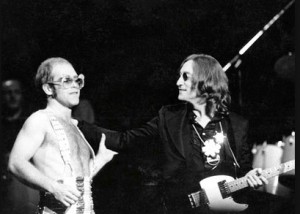 Recorded for the “Walls and Bridges” LP, Lennon had little faith that the song would make an impact as a single. But Elton felt otherwise. He made a wager: if the song hit number one, John would have to promise to perform at Elton’s Thanksgiving concert at Madison Square Garden on November 28, 1974. On November 10, the song rocketed to number one in the U.S., and John made good on his promise. To the audience’s great surprise, a very nervous former Beatle took the stage with Elton to sing “Whatever Gets You Through the Night,” “Lucy in the Sky with Diamonds,” and “I Saw Her Standing There.”
Recorded for the “Walls and Bridges” LP, Lennon had little faith that the song would make an impact as a single. But Elton felt otherwise. He made a wager: if the song hit number one, John would have to promise to perform at Elton’s Thanksgiving concert at Madison Square Garden on November 28, 1974. On November 10, the song rocketed to number one in the U.S., and John made good on his promise. To the audience’s great surprise, a very nervous former Beatle took the stage with Elton to sing “Whatever Gets You Through the Night,” “Lucy in the Sky with Diamonds,” and “I Saw Her Standing There.”
Who would have ever imagined that it would be John’s final concert performance?
Out the blue or out of sight,
S’alright, John. S’alright.
Watch this fabulous video of the song. It’s comprised of animations of John’s whimsical drawings.
By Dana Spiardi, Oct 9, 2014
]]>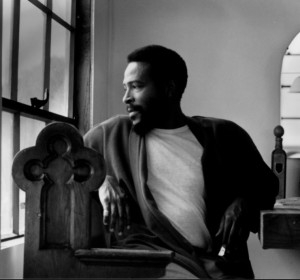 Where did all the blue skies go?
Where did all the blue skies go?
Poison is the wind that blows from the north and south and east…
Oil wasted on the ocean and upon our seas
Fish full of mercury…
Radiation under ground and in the sky
Animals and birds who live nearby are dying…
How about this overcrowded land
How much more abuse from man can she stand?
“Mercy Mercy Me” is no doubt the first and perhaps the only Top 40 hit to address the sad state of the environment. It was the second single released from “What’s Going On,” Marvin’s groundbreaking 1971 concept/protest album that confronted issues like injustice, the Vietnam War, police brutality, poverty, and other social ills.
In 1991 Motown Records released this moving “Mercy Mercy Me” video, seven years after Marvin was shot and killed by his father during a domestic dispute. Numerous celebrities appear throughout the video to show their support for environmental protection. Marvin’s message resonates now as much as ever, in these days of fracking, oil spills, and carbon dioxide emissions.
© Dana Spiardi, April 22, 2015
]]>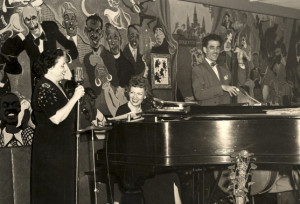 Legend has it that Dorothy Sloop, nicknamed Sloopy, was the song’s inspiration. A native of Steubenville, Ohio, she was a jazz musician who played piano with numerous female bands from the 1930s through the ’50s. In 1957, she and jazz vocalist and clarinetist Yvonne “Dixie” Fasnacht released an album called “Dixie and Sloopy,” and performed regularly at Dixie’s Bar of Music on Bourbon Street in New Orleans.
Legend has it that Dorothy Sloop, nicknamed Sloopy, was the song’s inspiration. A native of Steubenville, Ohio, she was a jazz musician who played piano with numerous female bands from the 1930s through the ’50s. In 1957, she and jazz vocalist and clarinetist Yvonne “Dixie” Fasnacht released an album called “Dixie and Sloopy,” and performed regularly at Dixie’s Bar of Music on Bourbon Street in New Orleans.
It’s rumored that the now-deceased composers of “Hang on Sloopy,” Wes Farrell and Bert Russell Berns, may have frequented Dixie’s club, and took notice of the woman with the funny nickname. But details regarding the song’s title are a mystery to this day. It seems that no one really knows if the two men ever actually met the pianist.
“Hang on Sloopy,” which hit the #1 spot on the Billboard charts on this date in 1965, was originally recorded by The Vibrations in 1964. But it was the version released by the Ohio-based Rick and the Raiders — renamed The McCoys to avoid confusion with Paul Revere and The Raiders — that became one of rock’s most enduring singles. The song features lead vocals by 16-year-old band leader Rick Zehringer, thereafter known as Rick Derringer, who would go on to a long career as a singer, guitarist and producer.
“Hang on Sloopy” quickly became a jukebox favorite at the CharBar near the main entrance to Ohio State University in Columbus. Soon, the OSU marching band began playing the song during football games. The crowd loved it, and it quickly became the band’s anthem. To this day, it’s played before the start of the fourth quarter of every O.S.U. Buckeye game.
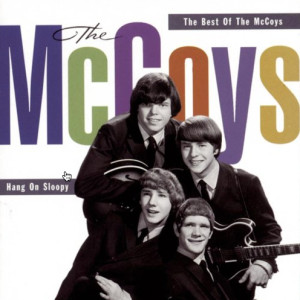 It’s since become the official song of Major League Baseball’s Cleveland Indians, AND the official rock song of the State of Ohio. (All states have songs – usually ballads, waltzes, and folk songs – but Ohio is the only one to have an official rock song (“Louie Louie” is the unofficial rock song of Washington state!)
It’s since become the official song of Major League Baseball’s Cleveland Indians, AND the official rock song of the State of Ohio. (All states have songs – usually ballads, waltzes, and folk songs – but Ohio is the only one to have an official rock song (“Louie Louie” is the unofficial rock song of Washington state!)
Sloopy is also played during the Cleveland Cavaliers’ home-court basketball games, and at the end of the 3rd quarter of most Cleveland Browns home football games.
So, what became of Dorothy Sloop? She didn’t learn of her connection to the hit song until years later when she was working for a children’s TV program in Lubbock, Texas. Although her daughter Jane Heflick said Dorothy was very pleased to serve as the song’s inspiration, she never sought royalties and only briefly mentioned the record in her personal memoir. Following her jazz career, she earned a master’s degree and taught special education for three decades in St. Petersburg, FL, passing on at age 84.
Now, what’s the origin of The Beach Boys’ “Sloop John B”? That’s a topic for another discussion.
Here are The McCoys with their only #1 hit. Feel free to sing along.
© Dana Spiardi, Sept 2, 2014
]]>
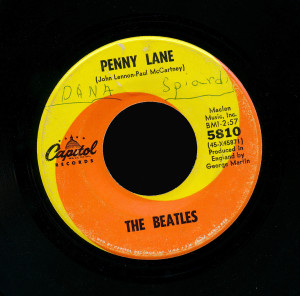 Forty-seven years ago this month, the Beatles released their 24th U.S. single, a double A-side record featuring two songs inspired by John Lennon and Paul McCartney’s childhood memories of Liverpool: “Strawberry Fields Forever” and “Penny Lane.” Paul wrote the idyllic “Penny Lane” based on happy recollections of the suburban Liverpool street where he and John would meet to catch the bus to the city center. John named his surreal “Strawberry Fields Forever” after a Salvation Army children’s home near the gardens where he played as a boy. (Interestingly, John originally planned to incorporate Penny Lane and other Liverpool haunts into one of his earlier nostalgic songs, “In My Life,” but he ended up dropping all references to specific landmarks.)
Forty-seven years ago this month, the Beatles released their 24th U.S. single, a double A-side record featuring two songs inspired by John Lennon and Paul McCartney’s childhood memories of Liverpool: “Strawberry Fields Forever” and “Penny Lane.” Paul wrote the idyllic “Penny Lane” based on happy recollections of the suburban Liverpool street where he and John would meet to catch the bus to the city center. John named his surreal “Strawberry Fields Forever” after a Salvation Army children’s home near the gardens where he played as a boy. (Interestingly, John originally planned to incorporate Penny Lane and other Liverpool haunts into one of his earlier nostalgic songs, “In My Life,” but he ended up dropping all references to specific landmarks.)
When it came to musical styles, John and Paul were often yin and yang personified. “Penny Lane,” with its spritely trumpet flourishes, is as chipper and straightforward as the multi-layered “Strawberry Fields Forever” is sad and mysterious.
I was seven years old when I bought this 45 rpm record after hearing “Penny Lane” on the radio. It was the perfect little tune for a child, with its storybook-like references to the barber, the banker, the fireman, and the pretty nurse selling poppies from a tray. In time I would discover the meaning of the song’s British terminology.
I would learn that a “mac” is short for Mackintosh, a waterproof raincoat. “Four of fish” refers to four pennies’ worth of fish and chips. The poppies are to be worn on Armistice Day to honor the lost souls of WWI. A “roundabout” is a circular intersection, common in England. And, as for “finger pie”…well, I’ll leave it to your imagination. I like to keep my blog clean. It’s a clean machine.
But then I flipped the record over, and entered a completely different world. My puzzlement over a few words in “Penny Lane” was nothing compared to my bewilderment over the imagery in “Strawberry Fields Forever.” My child brain was baffled:
Always, no sometimes, think it’s me,
but you know I know when it’s a dream.
I think I know, I mean a ‘yes’ – but it’s all wrong,
that is I think I disagree.
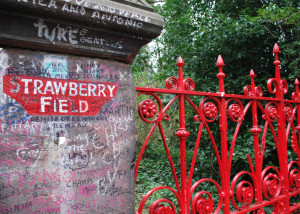 I discovered something way back then, and it’s been with me all my life: it doesn’t really matter if I don’t understand the meaning, message, or critic’s opinion of a piece of art – be it a song, a film or a painting. What’s most important is how it makes me feel. And there is no other Beatles’ song that makes me feel the way that “Strawberry Fields Forever” does. As I entered my bluesy, oddball, often solitary teenage years, I came to believe that if the Beatles produced one song specifically targeted to my soul, this was it. Even if no one else understood me, John Lennon surely did: Let me take you down…No one I think is in my tree…living is easy with eyes closed, misunderstanding all you see…it doesn’t matter much to me. Lyrically and musically, “Strawberry Fields” is the perfect eccentric song for the self-absorbed, mood-spinning outsider — far surpassing Paul Simon’s maudlin “I Am A Rock” or Janis Ian’s weepy (but wise) “At Seventeen.”
I discovered something way back then, and it’s been with me all my life: it doesn’t really matter if I don’t understand the meaning, message, or critic’s opinion of a piece of art – be it a song, a film or a painting. What’s most important is how it makes me feel. And there is no other Beatles’ song that makes me feel the way that “Strawberry Fields Forever” does. As I entered my bluesy, oddball, often solitary teenage years, I came to believe that if the Beatles produced one song specifically targeted to my soul, this was it. Even if no one else understood me, John Lennon surely did: Let me take you down…No one I think is in my tree…living is easy with eyes closed, misunderstanding all you see…it doesn’t matter much to me. Lyrically and musically, “Strawberry Fields” is the perfect eccentric song for the self-absorbed, mood-spinning outsider — far surpassing Paul Simon’s maudlin “I Am A Rock” or Janis Ian’s weepy (but wise) “At Seventeen.”
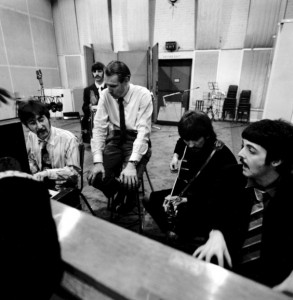 And then there’s the song’s haunting, dreamlike music: the eerie opening sound of the Mellotron; the heavy, dirge-like drums; the delicate placement of the zither-like swarmandal chords; the desperate, piping trumpets and droning cellos. Producer George Martin and sound engineer Geoff Emerick pushed their prodigious skills to the limit to satisfy John’s ever-changing demands for an otherworldly sound. Tape speeds were altered, tracks were played backwards and numerous song versions were spliced together – with nothing more at the engineers’ disposal than editing scissors, two tape machines, and a vari-speed control. It’s no wonder the song took five weeks and 45 hours to record! It’s the Beatles’ masterpiece.
And then there’s the song’s haunting, dreamlike music: the eerie opening sound of the Mellotron; the heavy, dirge-like drums; the delicate placement of the zither-like swarmandal chords; the desperate, piping trumpets and droning cellos. Producer George Martin and sound engineer Geoff Emerick pushed their prodigious skills to the limit to satisfy John’s ever-changing demands for an otherworldly sound. Tape speeds were altered, tracks were played backwards and numerous song versions were spliced together – with nothing more at the engineers’ disposal than editing scissors, two tape machines, and a vari-speed control. It’s no wonder the song took five weeks and 45 hours to record! It’s the Beatles’ masterpiece.
John and Paul truly did leave their hearts in Liverpool. By the time they recorded “Penny Lane” and “Strawberry Fields Forever” – songs originally intended for the upcoming “Sgt. Pepper’s Lonely Hearts Club Band” LP, the groundbreaking album that defined the psychedelic Summer of Love – the Beatles had literally seen it all. They had set the decade’s trends in music, fashion, lifestyle, and mind-altering substances, but they longed for simplicity and solitude, often yearning to “get back” to where they once belonged. They ruled a modern world, but they never forgot their roots. While their songs rarely referred specifically to their hometown lives and loves, their music was always full of the scrappy soul of working-class Liverpool.
Here’s the ultimate music video, from 1967! Is John saying “I buried Paul”…or “cranberry sauce?” at the end? You be the judge.
And now we’ll pick up the mood a bit. I don’t want you to go away in a funk.
© Dana Spiardi, Feb 19, 2014
]]>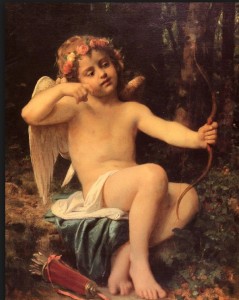 The record’s producers originally asked Sam to compose the song for a long-forgotten female singer to release, but they came to their senses when they heard Cooke croon the tune. It had “hit” written all over it. Released on May 16, 1961, it reached #7 on the Billboard Hot 100 and charted well in England, too. The song inspired a lot of young British singers, notably Rod Stewart, to hone their singing chops.
The record’s producers originally asked Sam to compose the song for a long-forgotten female singer to release, but they came to their senses when they heard Cooke croon the tune. It had “hit” written all over it. Released on May 16, 1961, it reached #7 on the Billboard Hot 100 and charted well in England, too. The song inspired a lot of young British singers, notably Rod Stewart, to hone their singing chops.
Many people have covered this famous song. None can match the poignant sense of desperation that Sam’s flawless voice evokes. But here are a few stand-outs that I personally like.
Check out the Czech! Singer Pavel Bobek delivers a song to the music of “Cupid.” It’s a reggae cut called “Úsvit,” which means dawn.
Gram Parker’s version is a very close interpretation of Sam’s original.
And I can’t forget the late, great Amy Winehouse, one of my favorite artists. She, too, delivers a reggae version. I think she was pleading for something that even Cupid couldn’t provide.
Finally, here’s beautiful Sam, singing “Cupid” live at the Harlem Square Club in 1963.
© Dana Spiardi, Feb 14, 2015
]]>